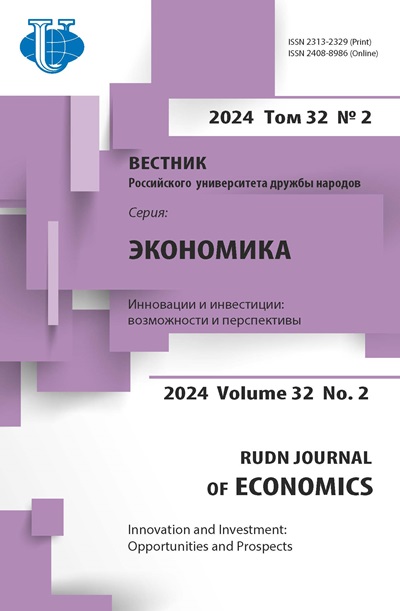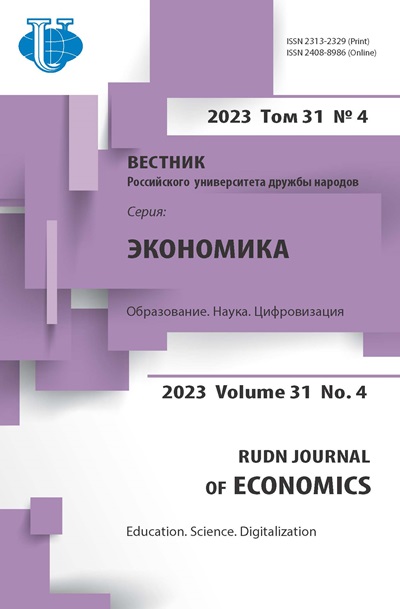Развитие Ирана в рамках концепции экономики знаний: преодоление санкций и повышение национальной конкурентоспособности
- Авторы: Резаинежад И.1, Лавров С.Н.1, Симонов А.Г.1
-
Учреждения:
- Российский университет дружбы народов
- Выпуск: Том 31, № 4 (2023): ОБРАЗОВАНИЕ. НАУКА. ЦИФРОВИЗАЦИЯ
- Страницы: 814-829
- Раздел: Экономика развитых и развивающихся стран
- URL: https://journals.rudn.ru/economics/article/view/37314
- DOI: https://doi.org/10.22363/2313-2329-2023-31-4-814-829
- EDN: https://elibrary.ru/SQHCMD
Цитировать
Полный текст
Аннотация
Концепция экономики знаний подразумевает создание экономической системы, в которой производство товаров и оказание услуг принципиально основывается на интенсивном использовании знаний и технологий, что способствует продвижению технических и научных инноваций. Экономическая система в рамках экономики знаний лишена множества ограничений, присущих традиционной экономики. Данная статья посвящена анализу перспектив внедрения экономики знаний в Иране. В последние годы возрос масштаб инновационной деятельности, а значит и потребность в переходе к экономике знаний. Однако данная работа демонстрирует, что развитие исключительно с упором на создание знаний не может быть эффективным: полученное знание должно внедряться и применяться реальным бизнесом. Иран может получить выгоду в том случае, если экспертиза национального научного сообщества и бизнеса будет использоваться более интенсивно; в противном случае может возрасти уязвимость, вызванная опорой исключительно на иностранные инновационные технологии. В рамках сложившихся условий Иран, находящийся в условиях возрастающего санкционного давления, должен искать возможности для коммерциализации отечественных исследований и разработок.
Об авторах
Исмаэль Резаинежад
Российский университет дружбы народов
Email: 1042225184@pfur.ru
аспирант кафедры международных экономических отношений Российская Федерация, 117198, Москва, ул. Миклухо-Маклая, д. 6
Сергей Николаевич Лавров
Российский университет дружбы народов
Email: lavrov_sn@rudn.ru
доктор экономических наук, профессор Российская Федерация, 117198, Москва, ул. Миклухо-Маклая, д. 6
Александр Геннадьевич Симонов
Российский университет дружбы народов
Автор, ответственный за переписку.
Email: simonov_ag@rudn.ru
кандидат экономических наук, доцент Российская Федерация, 117198, Москва, ул. Миклухо-Маклая, д. 6
Список литературы
- Abbas, J., Sağsan, M. (2019). Impact of knowledge management practices on green innovation and corporate sustainable development: A structural analysis. Journal of cleaner production, 229, 611-620.
- Alvesson, M. (2004). Knowledge work and knowledge-intensive firms. OUP Oxford.
- Bejinaru, R. (2019). Impact of digitalization on education in the knowledge economy. Management Dynamics in the Knowledge Economy, 7(3), 367-380.
- Brinkley, I. (2006). Defining the knowledge economy. London: The work foundation.
- Chaharband, F., Momeni, F. (2012). Challenges and Perspectives in Knowledge Based Development in Iran: Basic Education Approach. Economic Growth and Development Research, 1(4), 116-75.
- Chen, D.H., & Dahlman, C.J. (2005). The knowledge economy, the KAM methodology and World Bank operations. World Bank Institute Working Paper: 37256.
- Cooke, P., & Leydesdorff, L. (2006). Regional development in the knowledge-based economy: The construction of advantage. The journal of technology Transfer, 31, 5-15.
- Fakhari, H. (2014). Review of Knowledge-based Firms Definition Consistent with the Economic Conditions of Iran. Journal of Science and Technology Policy, 7(4), 69-88.
- Foray, D., & Lundvall, B.Å. (2009). The knowledge-based economy: from the economics of knowledge to the learning economy. In The economic impact of knowledge (pp. 115-121). Routledge.
- Ghassib, H. (2012). A theory of the knowledge industry. International Studies in the Philosophy of Science, 26(4), 447-456.
- Godin, B. (2006). The knowledge-based economy: conceptual framework or buzzword? The Journal of technology transfer, 31, 17-30.
- Hadad, S. (2018). The geographic distribution of Knowledge Economy (KE) within the European Union (EU). Management & Marketing, 13(3), 1089-1107.
- Héraud, J.A. (2021). A new approach of innovation: From the knowledge economy to the theory of creativity applied to territorial development. Journal of the Knowledge Economy, 12, 201-217.
- Ibidunni, A.S. (2020). Exploring knowledge dimensions for improving performance in organizations. Journal of Workplace Learning, 32(1).
- Iqbal, A., Latif, F., Marimon, F., Sahibzada, U.F., & Hussain, S. (2018). From knowledge management to organizational performance: Modelling the mediating role of innovation and intellectual capital in higher education. Journal of Enterprise Information Management, 32(1).
- Karpova, N.S., Lavrov S.N., & Simonov, A.G. (2014). Mezhdunarodnye Gazovye Proekty Rossii: Evropeĭskiĭ Alʹi a ans I Strategicheskie Alʹternativy [International Gas Projects of Russia: European Alliance and Strategic Alternatives]. Moscow: TEIS.
- Mejri, K., MacVaugh, J.A., & Tsagdis, D. (2018). Knowledge configurations of small and medium-sized knowledge-intensive firms in a developing economy: A knowledge-based view of business-to-business internationalization. Industrial marketing management, 71, 160-170.
- Nakano, Y. (2007). Comparison of several types of knowledge industries between Japan and Europe, International Input-Output Association. In The 16th IIOA Conference, Istanbul.
- Ode, E., & Ayavoo, R. (2020). The mediating role of knowledge application in the relationship between knowledge management practices and firm innovation. Journal of Innovation & Knowledge, 5(3), 210-218.
- Partha, D., & David, P.A. (1994). Toward a new economics of science. Research policy, 23(5), 487-521.
- Popkova, E.G. (2019). Preconditions of formation and development of industry 4.0 in the conditions of knowledge economy. Industry 4.0: Industrial Revolution of the 21st Century, 65-72.
- Popkova, E.G., Ragulina, Y.V., & Bogoviz, A.V. (Eds.). (2019). Industry 4.0: Industrial revolution of the 21st century. Vol. 169, p. 249). Berlin/Heidelberg, Germany: Springer.
- Rezaeinejad, I. (2021). Challenges and opportunities cryptocurrency in Iran economy & e-businesses. RUDN Journal of Economics, 29(4), 689-698.
- Rezaeinejad, I. (2022). Analytical Study of the International Economic Policies of Iran and Russia: A Move to Bilateral Cooperation under Sanctions. Economics, 10(4), 36-44.
- Rezaeinejad, I., ZeraatPeyma, S., & Zhen, D. (2023, October). International economic policy of Iran, Pakistan and Kazakhstan within China “Belt and Road” initiative. In E3S Web of Conferences (Vol. 381, p. 02029).
- Rooney, D. (2005). Knowledge, economy, technology and society: The politics of discourse. Telematics and informatics, 22(4), 405-422.
- Smith, K.H. (2002). What Is the “Knowledge Economy”? Knowledge Intensity and Distributed Knowledge Bases. RePEc: Research Papers in Economics (2002).
- Soete, L. (1997). Macroeconomic and Structural Policy in the Knowledge-Based Economy; National Policy Challenges. OECD Proceedings Industrial Competitiveness in the Knowledge-Based Economy; The New Role of Governments. Paris: OECD.
- Valibeigi, M., Mohammadi, A., & Valibeigi, M. (2020). Structural Challenges of KnowledgeBased Economy in Iran. Eko-Regional: Journal Pembangunan Ekonomi Wilayah, EKO-REGIONAL, 15(2), 74-86
- White, D.S., Gunasekaran, A., & Ariguzo, G.C. (2013). The structural components of a knowledgebased economy. International Journal of Business Innovation and Research, 7(4), 504-518.
- Wong, P.K., Ho, Y.P., & Singh, A. (2007). Towards an «entrepreneurial university» model to support knowledge-based economic development: the case of the National University of Singapore. World Development, 35(6), 941-958.
- Yang, Z., Nguyen, V.T., & Le, P.B. (2018). Knowledge sharing serves as a mediator between collaborative culture and innovation capability: an empirical research. Journal of Business & Industrial, Marketing, 33(7).















